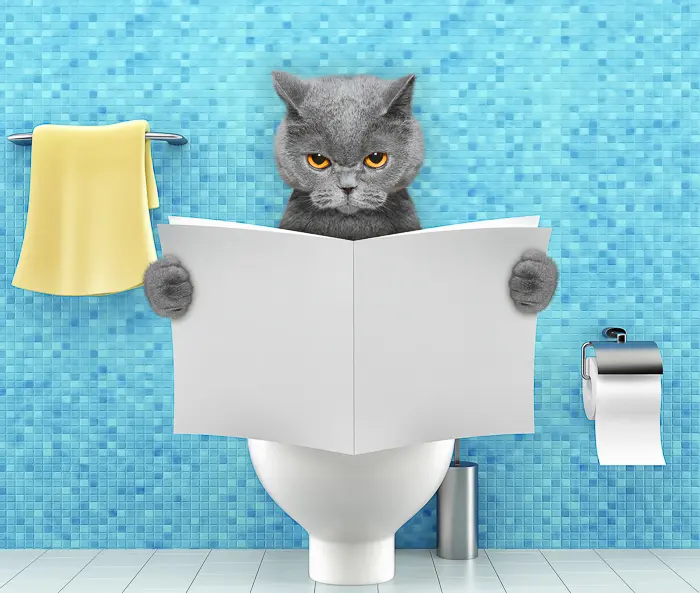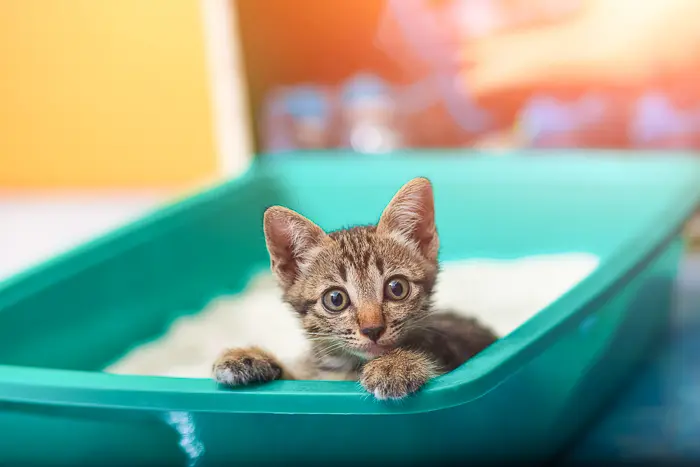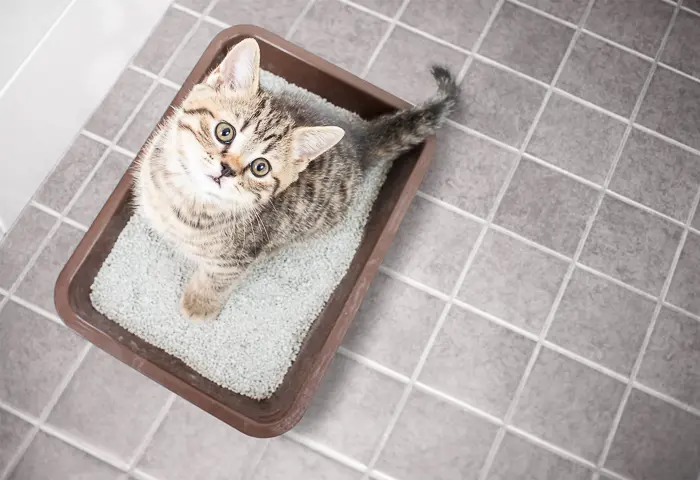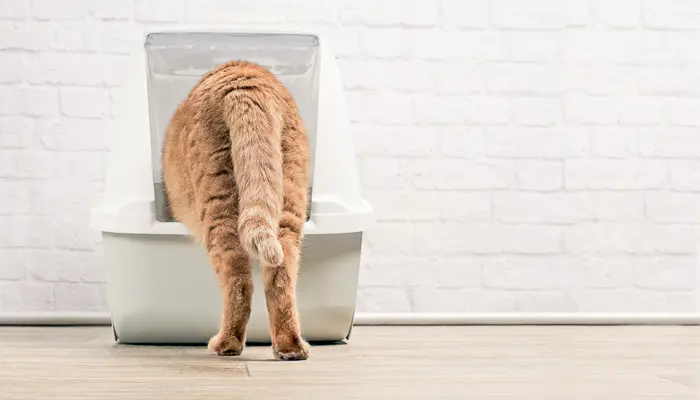You can tell a lot about a cat by their urine and any changes in their urination behaviors. Urine color, consistency, and amount can tell us so much, as well as the frequency of urination. Knowing how often do cats pee will help you monitor your own cat and help you know if and when you should be concerned about a potential health problem.

Dr. Jess explains more on this topic below:
What is Urine, AKA Cat Pee?
It is called many things, but cat pee, is often referred to as cat urine, at least in the veterinary clinic.
I will use these two terms, pee and urine, interchangeably in this article.
Urine is the collection of excess water and excess substances not being used any longer by the body.
The kidneys send their excess substances to the bladder by tubes called the ureters, to collect until this collection is ready to be voided from the body as urine from the urethra.
Why Do Cats Pee?
Cats pee because they need to eliminate or remove the urine that collects in their bladders.
So why do cats collect urine in their bladders?

What Does Normal Cat Urine Look Like?
Normal, healthy cat urine should be light yellow or clear in color and without debris, cloudiness, or anything freely floating in it.
If your cat's urine is red, dark brown, brown, or pink or red-tinged, this could mean that there is blood in the urine, definitely a medical concern that should be brought to your local vet's attention immediately.
If you are not sure, snap a picture of your cat's urine and show your vet what you are seeing. Same thing goes for if your cat is peeing outside of their litter box!
I will discuss this in more detail a little further into this article.
How Much Do Cats Urinate?
How much your cat urinates can depend on a lot of factors.
That being said, it is important that you know what is “normal” for your cat, in terms of both frequency of urination, and how much that your cat urinates when they pee.
If you know what is normal for your pet, then you can know immediately when something just isn't right, and a potential problem arises.
The majority of the water that your cat takes in, leaves their body in the form of urine…. it's got to come out somehow.
… but just how much should be coming out at one time?
One article, written by my urology professor in veterinary school, Dr. Carl A. Osborne, DVM, PhD., DACVIM, states that:
In one study, healthy adult cats produced an average of 28 ml/kg of urine every 24 hours.
https://www.dvm360.com/view/ins-and-outs-polyuria-and-polydipsia-veterinary-practice
This means, that in a 10 pound cat, that's approximately 0.53 cups of urine a day, roughly half of a cup.
The production of increased volume of urine is termed polyuria.
When there is a decreased production of urine, it is termed oliguria.

When Do Cats Urinate?
Cats urinate whenever they are awake and feel the urge to go.
Some cats are good at always using the litter box or waiting until a clean one is available, and other cats are less choosy on when or where to go.
How Often Do Cats Pee?
Normal healthy adult cats usually urinate between 2 and 4 times a day. Keep in mind that this is just an average.
Some normal healthy cats may urinate just once or twice a day. Other completely normal cats may go more often. This is just a simple ballpark average.
The frequency can be affected by many things too, like any medications your cat may be taking, medical issues such as diabetes, their water intake, diet/food types, and weather (like how hot and humid the environment is).
If the frequency of your cat's urination unexpectedly increases, then contact your veterinarian to come up with a gameplan on what to do next as this can indicate potential medical issues.
Variables In Output:
1. WATER INTAKE
Cats that drink more water or eat more water through their wet food, will urinate more.
2. FOOD
Some cats also get liquids from their food.
Wet food has a substantial amount of water in it for your cat to consume, helping them stay hydrated.
So if your cat eats wet food, then know that they are also getting fluids from their wet food, on top of the water that they are drinking from the water bowls.
3. MEDICATION
Certain medications that your cat may take, can increase the frequency or amount of urine your cat produces.
Corticosteroids are a commonly administered medication that can make your cat (as well as other types of animals!) urinate more than normal.
4. STRESS
Some stressed cats urinate more when super stressed, and other cats pee less when stressed.
The best thing to do if you feel that your cat is stressed is to find out why they are stressed in the first place and remove the stressor from their environment.
5. MEDICAL ISSUES
Any type of medical condition, whether it is acute or chronic, may affect your cat's urine output.
In the next section, I will discuss some of the more commonly seen medical issues in cats that can affect their urination.

Medical Concerns & Cat Urine:
Some of the more common conditions that may make your cat urinate more or less often or in larger or smaller quantities include:
- Kidney Disease: Kidney disease can produce different urine production effects depending on the primary reason for the kidney disease, if the kidney disease is acute or chronic, and how much of each kidney is working appropriately.
- Urethral Blockage: Sometimes cats buildup crystals in their systems. This happens commonly because of their diet and most often in male cats because of their anatomy and “tubing” down “there”. When the crystals try to escape via the urethra (the tract from the bladder to the outside world) they can block the tract, causing the flow of urine to decrease or stop all together. This is a life-threatening emergency if your cat is completely obstructed because they have no way of voiding their urine. If your cat, especially if they are male, is having a hard time urinating, contact your vet at once.
- Diabetes: You may notice your cat drinking more water as well as urinating more frequently or in greater amounts.
- Bladder Infections / Inflammation / Cystitis: sometimes bladder infections make your cat feel like they need to urinate frequently. If your cat is urinating more frequently than normal and/or has cloudy or discolored urine when voiding, they may have signs of a bladder infection or inflammation.
- Thyroid Disorders: such as hyperthyroidism can cause your cat to pee more frequently.
- Cancer: Certain cancers of the urinary tract can cause your cat to have trouble urinating.
- Dehydration: If your cat is dehydrated, then they have very little reason to urinate and produce any output. If there is nothing going in, there can't be too much coming out.
Other References Used in This Article:
- Feyrecilde, Monique, BA, LVT, VTS (Behavior). Cats in Boxes: Feline House Soiling. Pacific Veterinary Conference 2015.
- George, Christopher M., DVM, and Gregory F. Grauer, DVM, MS, Diplomate ACVIM (Small Animal Internal Medicine). “Feline Urethral Obstruction: Diagnosis & Management.” Today's Veterinary Practice. NAVC, 01 Sept. 2016. Web. 22 Mar. 2017. <http://todaysveterinarypractice.navc.com/feline-urethral-obstruction-dia….
- Tyler, Ronald, Jr., DVM, MS. In-House Veterinary Pathology for the Busy Veterinary Practice – Clinical Urinalyses: Techniques and Interpretations. Southwest Veterinary Symposium 2016.

![[Vet Explains Pets]](https://vetexplainspets.com/wp-content/uploads/2024/09/cropped-vetlogo-199x66.png)

